In the run-up to the festive season, PlayBoard will be sharing daily social media posts with links to resources and further information focusing on why play matters and is central to all we do.
Stay tuned to our social media accounts – you will find the links at the bottom of the page.
1. On the first Playday of Christmas – What is play?
Play is what children and young people do in their own time and for their own reasons. Play refers to a wide range of activities – play can be physical, social, creative, challenging.
Children have a natural desire to play. Children can, and do, play anywhere and everywhere, and with anything. Play can be noisy or quiet, solitary or with others. Play is fun, with no goal in mind. Read more.
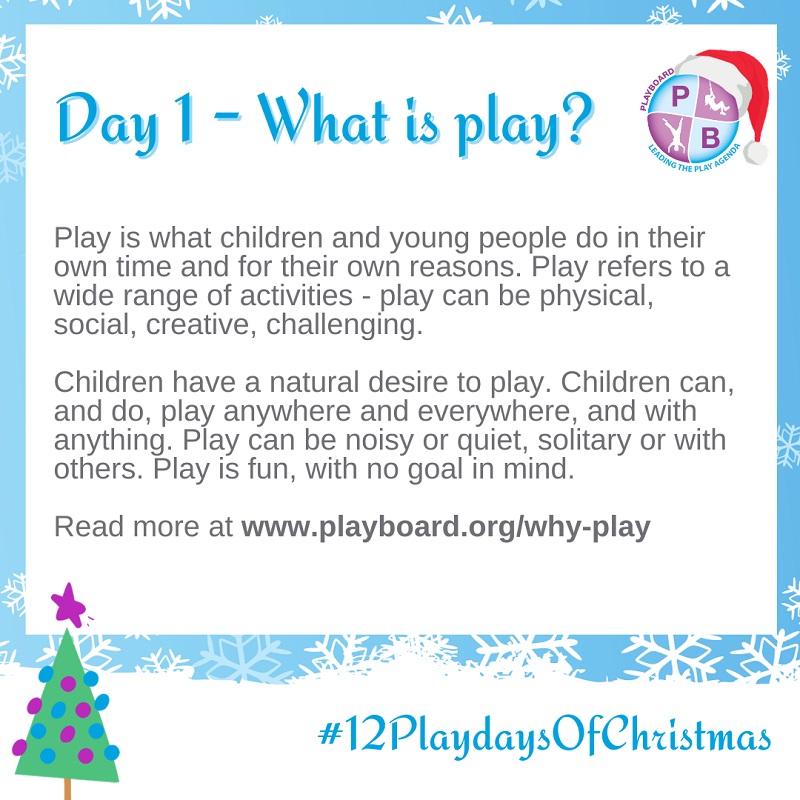
2. Second Playday of Christmas – Play matters
Play is a vital part of childhood and is essential for children’s healthy growth, development and well-being.
Play has many benefits for children and young people, supporting their physical health, mental health, and emotional well-being.
Play matters because play is the most natural way for children to learn, grow, develop, and make sense of the world and their place within it. Through play, children develop numerous skills and abilities necessary for building healthy, happy adults.
Play allows children to make friends, build social skills, learn to communicate, negotiate, work in a team, develop resilience, manage risk, build self-confidence, and boost their imagination and creativity.
Play can help reduce stress, foster independence, aid in the development of fine motor skills, improve strength and dexterity, healthy brain development, and much more! Read more in our Play for Parents Guide.
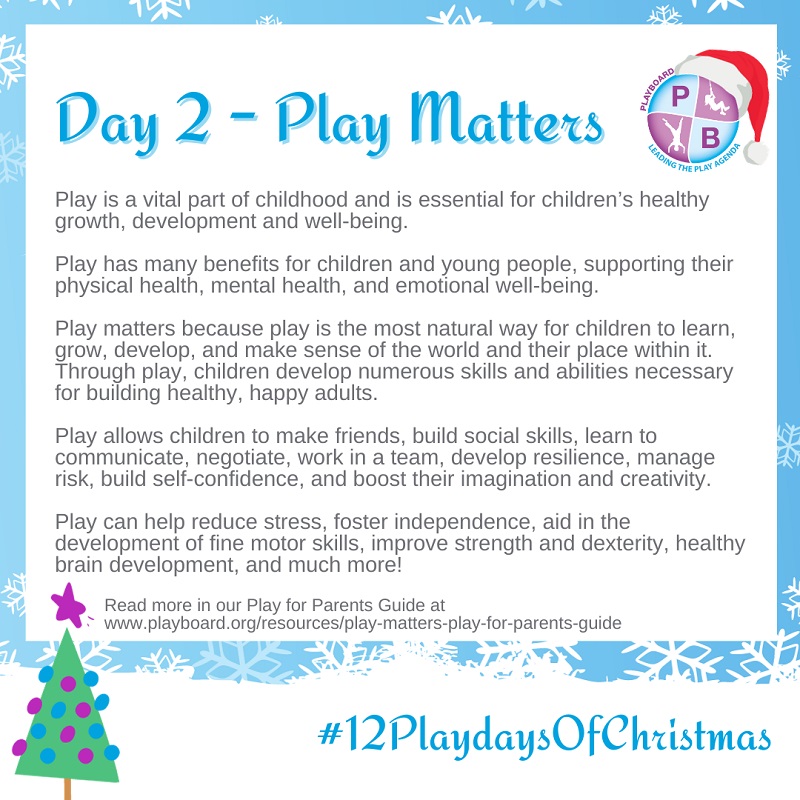
3. Third Playday of Christmas – Right to Play
Children are born with the same fundamental set of rights as all humans, with a number of additional rights due to their vulnerability.
The United Nations Convention on the Rights of the Child (UNCRC) contains 54 articles which were adopted by the UN General Assembly in 1989 and ratified by the governments of the UK and Ireland, committing all branches of government to ensuring that children are afforded the rights and protections contained within its articles.
Article 31 of the UNCRC formally enshrines the child’s right to play and the right to engage in other recreational activities, including participation in cultural activities and the arts. Read more about the child’s right to play.
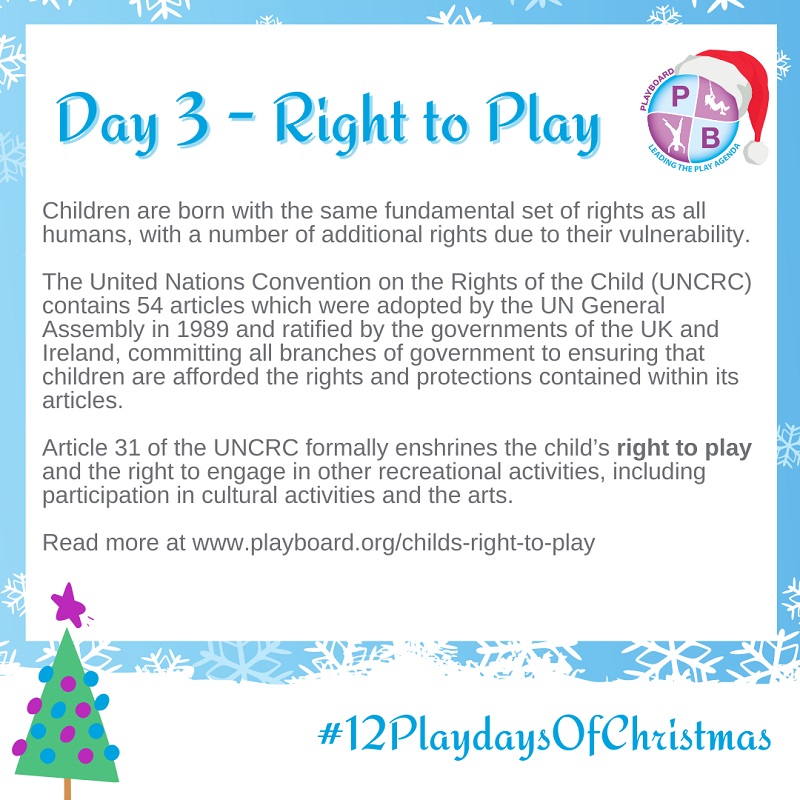
4. Fourth Playday of Christmas – Play throughout childhood
How children play changes throughout childhood and every child will play in different ways. Offering a supportive environment where children can access a range of play opportunities and providing space, time and materials will encourage play.
Play activities should consider the age of the child and their stage of development and ability, offering children choice and freedom.
As children get older they still need time, space and permission to play (although it may be called something else). Free time becomes increasingly important as the time spent on schoolwork and structured activities usually increases.
Read more in our Play for Parents Guide and Hanging out – older children at play information sheet.
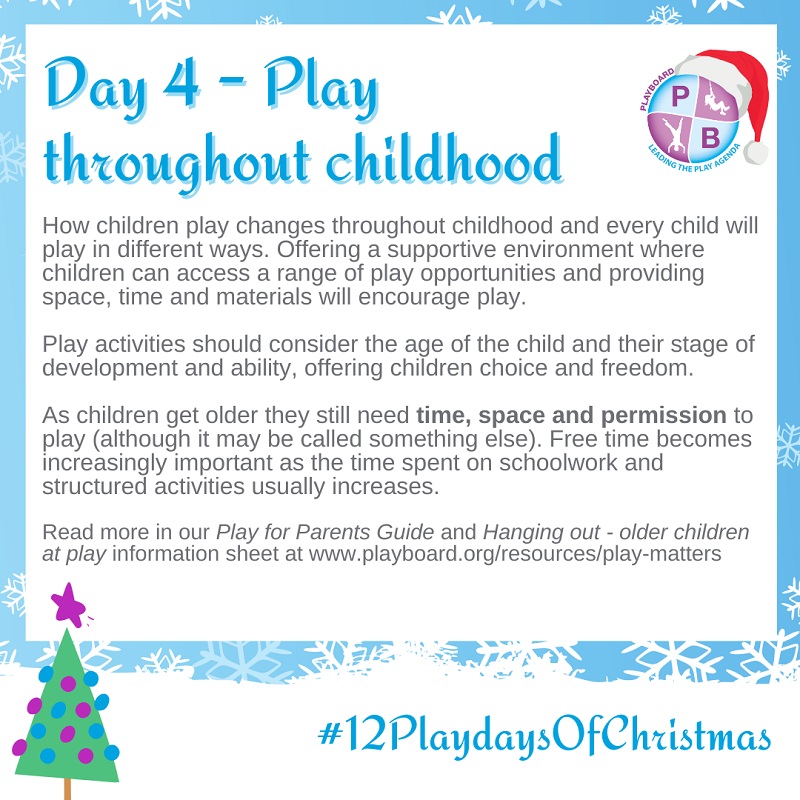
5. Fifth Playday of Christmas – UN CRC recommendations for the UK and Ireland
Children have the right to play. In June 2023, the UN’s Committee on the Rights of the Child recommended in its concluding observations for the UK, the following:
Rest, leisure, recreation and cultural and artistic activities
The Committee recommends that the State party:
(a) Develop a strategy, with sufficient resources, aimed at ensuring children’s right to rest, leisure and recreation, including free outdoor play;
(b) Integrate children’s right to play into school curricula and ensure that children have sufficient time to engage in play and recreational activities that are inclusive and age-appropriate;
(c) Strengthen measures to ensure that all children, including children with disabilities, young children, children in rural areas and children with disadvantaged socioeconomic backgrounds, have access to accessible and safe public outdoor play spaces;
(d) Involve children in decisions regarding urban-planning processes, including public transportation, and in the development of spaces for children to play.
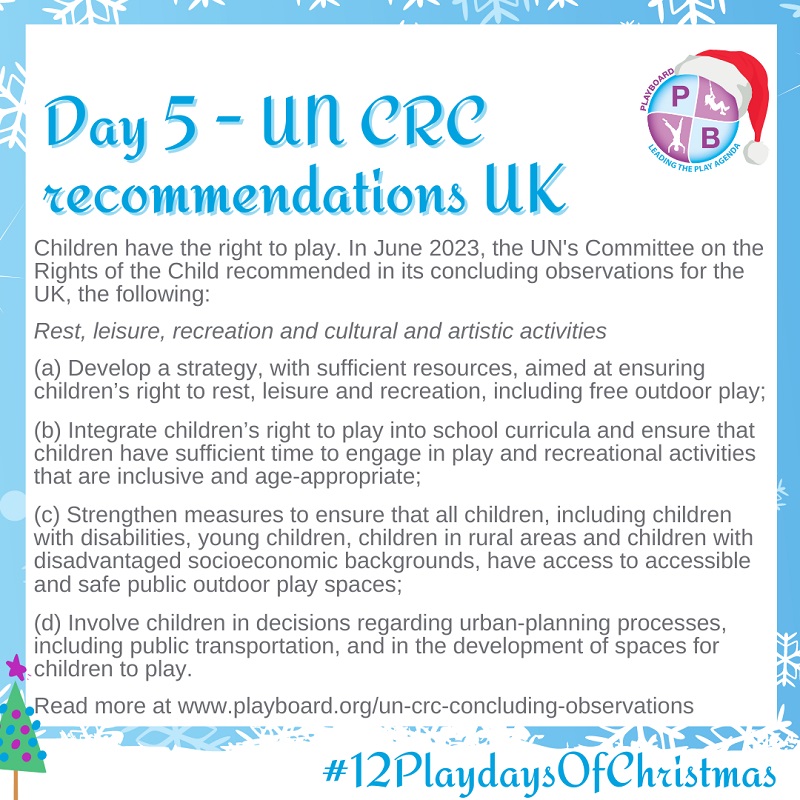
In February 2023, the UN’s Committee on the Rights of the Child recommended in its concluding observations for Ireland, the following:
Rest, leisure, recreation and cultural and artistic activities
The Committee recommends that the State party:
(a) Strengthen support for initiatives aimed at promoting children’s right to leisure, play, recreational activities, cultural life and the arts, including the sports action plan, the national network of sports inclusion disability officers and the creative youth plan;
(b) Ensure that such activities are available and accessible for girls, children with disabilities, asylum-seeking and migrant children and socioeconomically disadvantaged children;
(c) Fully involve children in planning, designing and monitoring the implementation of relevant policies and programmes.
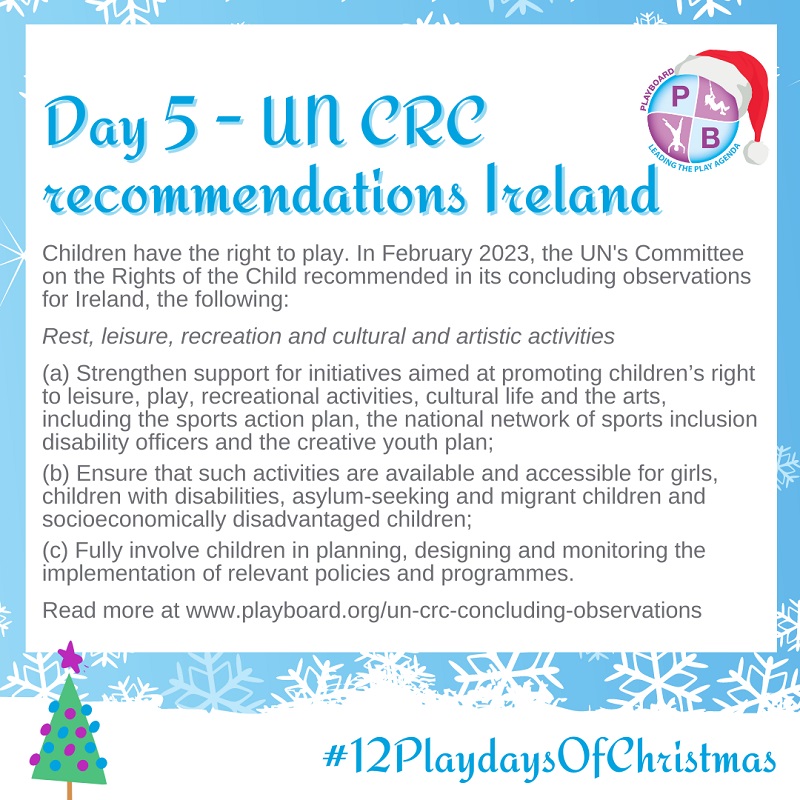
6. Sixth Playday of Christmas – Play types
Children need access to a balanced diet of play opportunities and experiences. Sixteen play types were developed by playworker, Bob Hughes. The list is not exhaustive but can help adults plan for play and recognise possible gaps in provision offered.
- Symbolic play
- Rough & tumble play
- Socio-dramatic play
- Social play
- Creative play
- Communication play
- Dramatic play
- Deep play
- Exploratory play
- Fantasy play
- Imaginative play
- Locomotor play
- Mastery play
- Object play
- Role play
- Recapitulative play
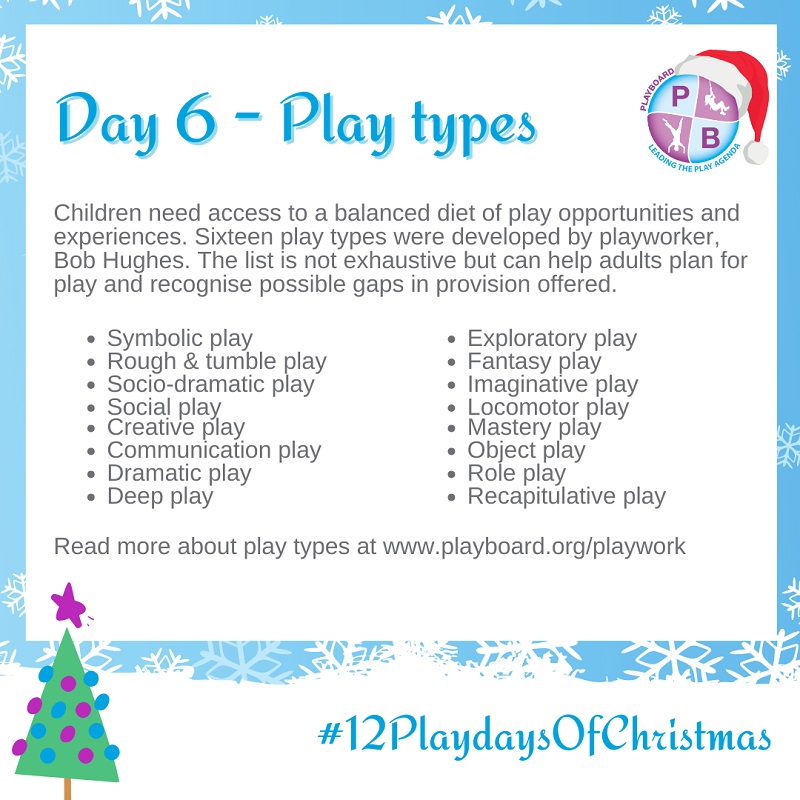
7. Seventh Playday of Christmas – Low-cost play
Play activity doesn’t need to cost lots of money or involve expensive toys or days out. There are many ‘free and found’ play opportunities that can take place within homes, communities, and settings.
Often the most effective types of play come through the use of free and found materials, also known as loose parts. Loose parts are items that children can use for play. They are resources that can be moved about, manipulated and adapted, and will provide high levels of flexibility and choice for children.
There are endless possibilities for how loose parts can be used and there is no right or wrong way to use them. They encourage creativity and imagination and develop skill and competence.
Read more in our Play in times of hardship resource and in our Playing with stuff around the house information sheet.
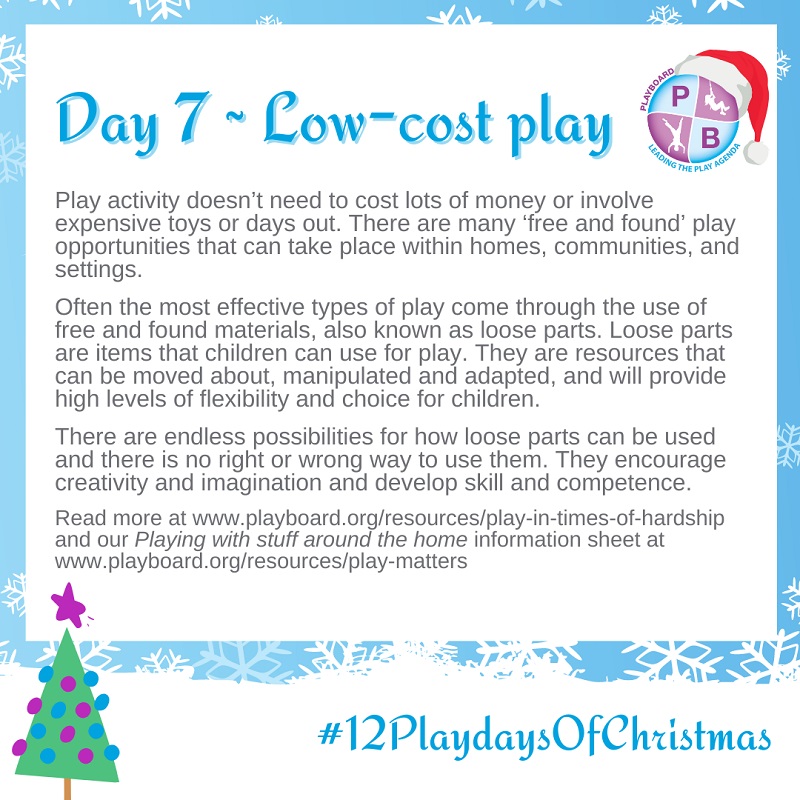
8. Eighth Playday of Christmas – Play in Schools
Play has a critical role in schools – offering an outlet for expending energy during break times, enhancing concentration levels within the classroom, and as a means of contributing to learning through the curriculum.
For many children and young people, the school playground represents the only open, accessible space that allows them to engage in physically challenging and socially developmental outdoor play.
Through offering quality play time and experiences, schools play a significant role in improving children and young people’s learning and development, and health and happiness.
Read about play in schools and PlayBoard’s training and play support programmes.
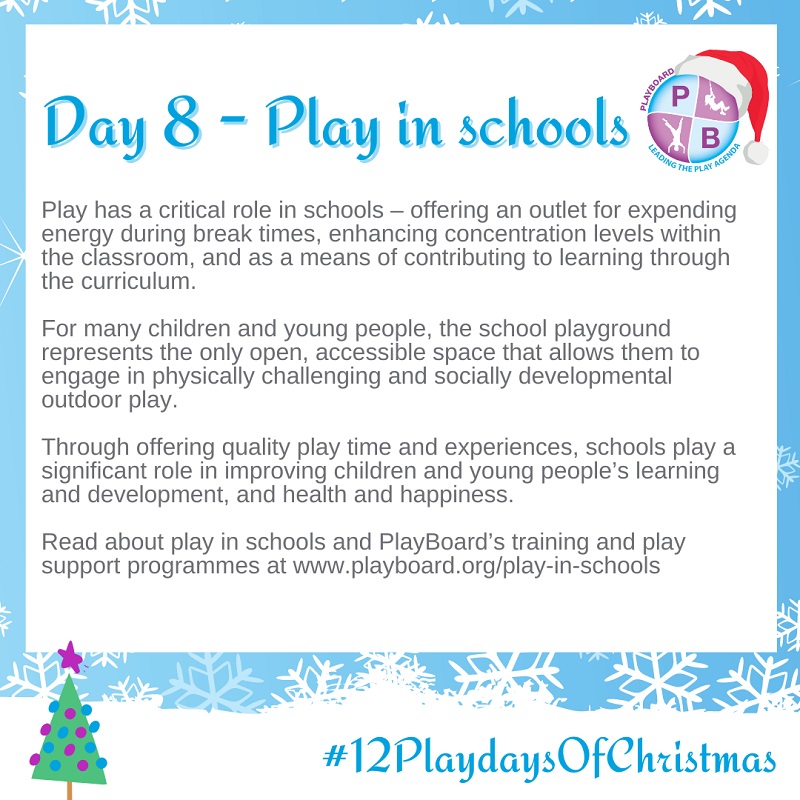
9. Ninth Playday of Christmas – Power of Play
Play is instrumental in supporting children and young people’s mental health and well-being. Play helps children develop resilience and to cope with stress and anxiety, supporting good mental health.
Through play, children can work through and make sense of difficult situations, work through uncertainty, and understand the world around them.
Read more in our Fostering resilience through play resource.
Our Spaces to Be programme (recently delivered as part of the OUR Generation project) advocates the use of play as a means of supporting both the development of childhood resilience, and as a mechanism for positively addressing differences at individual, familial and cross-community level.
Find out about our Spaces to Be programme and the impact it can make.
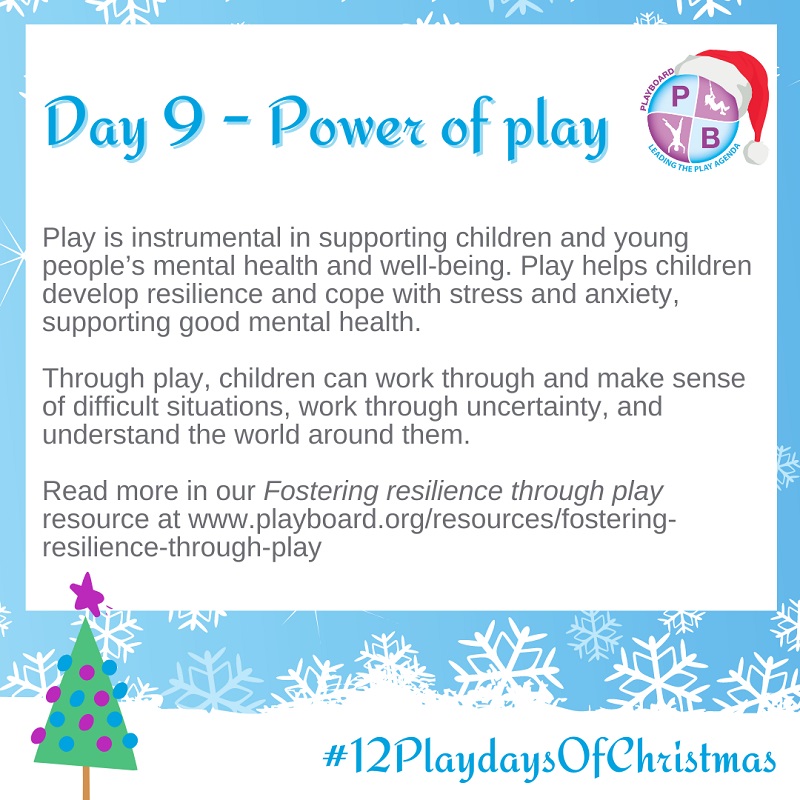
10. Tenth Playday of Christmas – Be a play champion!
Make time for play every day. Parents and carers – you are the biggest supporters of your children’s learning. You can make sure they have as much play as possible during the day to boost their health, happiness, and development.
Playing is the fundamental way for children to learn, grow, and develop. Play is for all children – even teenagers. Allow children to play freely, to be loud, to be messy, and to play outdoors.
Trust your own playful instincts – adopt a positive, playful attitude and find the fun, playful moments in the everyday.
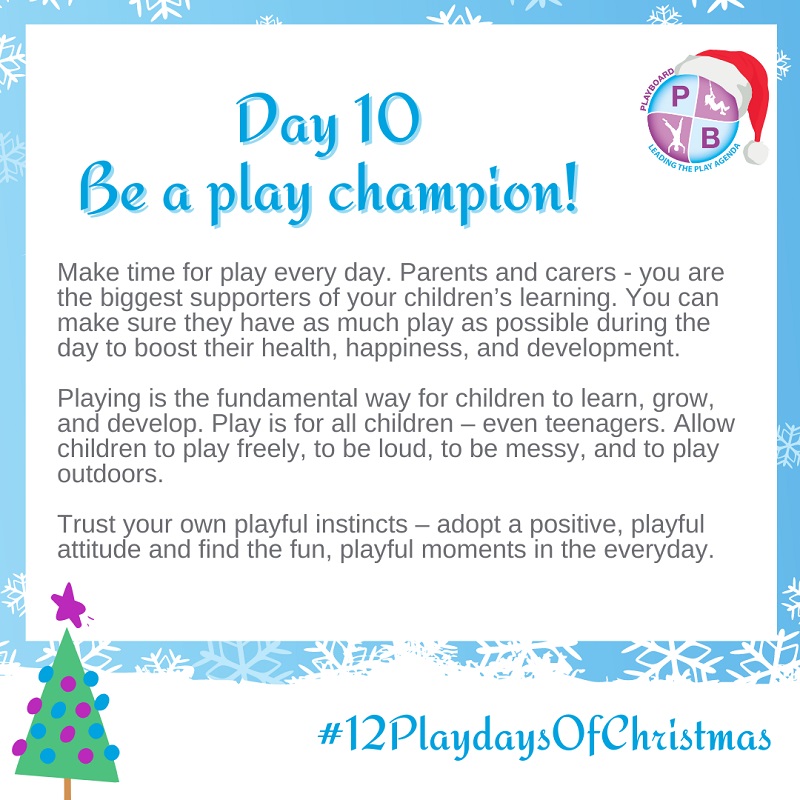
11. Eleventh Playday of Christmas – Playwork
Children can play anywhere, with or without equipment and materials, with others or on their own.
Adults who work with children and young people can support play by providing a wide range of opportunities and possibilities for play, in rich and supportive environments.
Playworkers support play that is led by children, providing children with space to be themselves and playing how they want to. Playworkers plan, observe and reflect.
To help make play work you need to consider the people and the place.
Read about these pillars of playwork (in a youth context) in our resource, Embedding play in youth settings.
Read more on playwork.
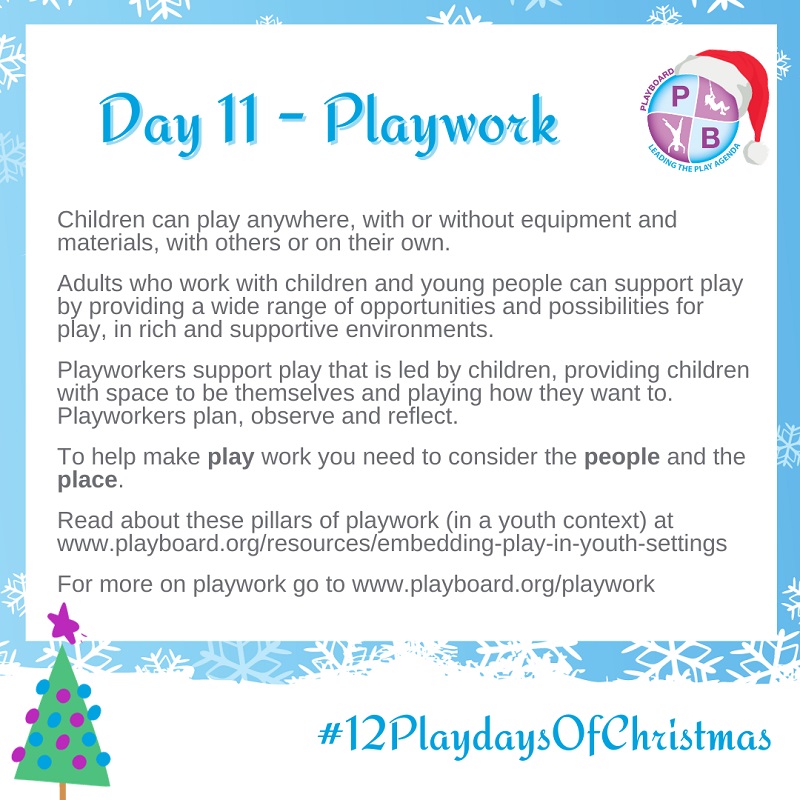
12. Twelfth Playday of Christmas – Wintry festive fun
It’s the final day of our 12 Playdays of Christmas. Today we’re sharing play ideas and activities for the festive season – indoors and out. View Wintry festive fun ideas.
Thank you for joining us as we counted down to Christmas. Sign up for free membership to keep updated with play news, events, and training in the new year.

